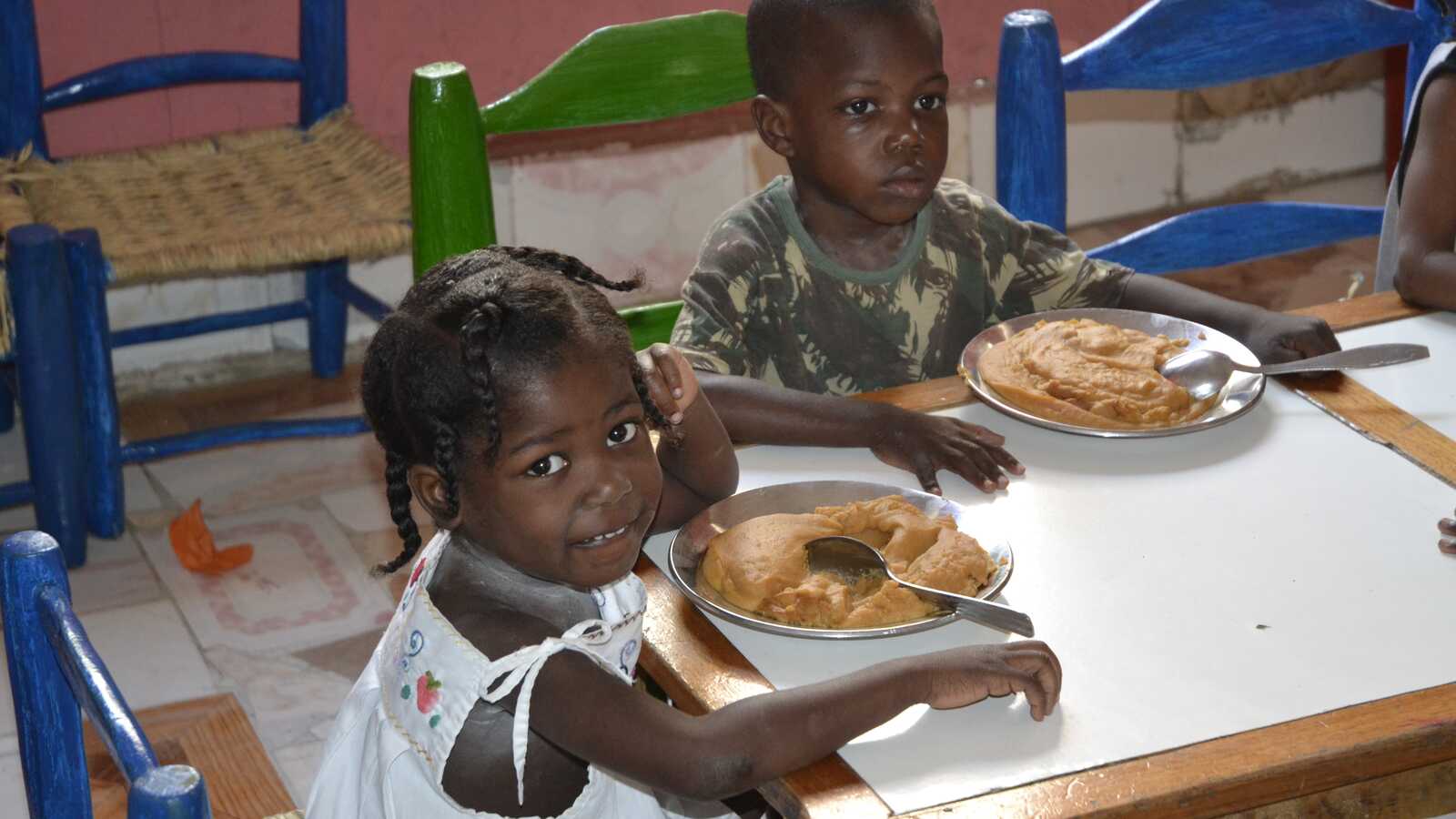In Haiti, jobs that pay the best tend to be considered “men’s jobs.” But with the support of Holt donors, one hard-working group of single moms is proving that they can do any job just as well as a man — especially for the sake of their children.
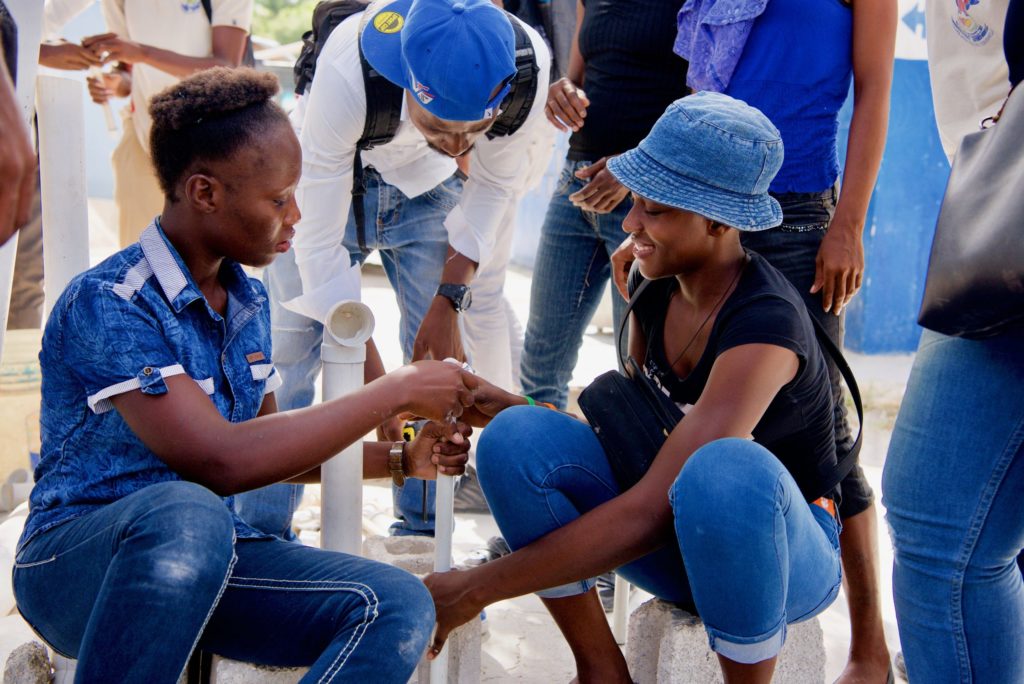
Last December, Stephanie’s neighbors started giving her advice.
‘If I were you, I’d start praying,’ they told her.
‘Maybe it’s Voodoo,’ some of them said.
‘He may not make it,’ they warned, preparing her for the worst.
Helplessly, Stephanie watched as her youngest son, Steven, grew weaker and weaker with each passing day. He simply wouldn’t eat. Everything he got down came back up.
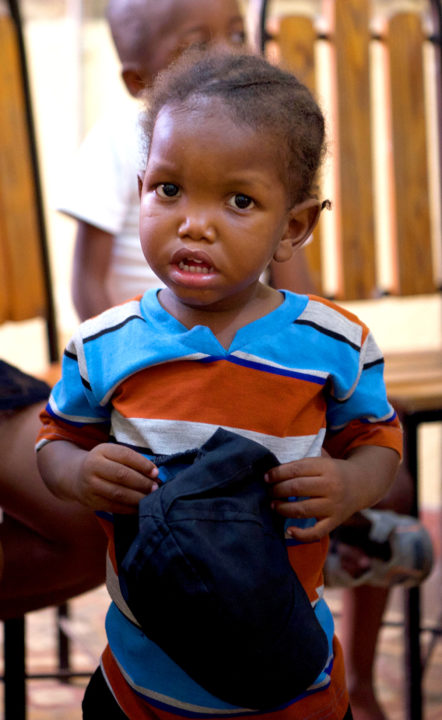
Although many parents in this situation would turn to anything, even Voodoo, if they thought it would save their child, Stephanie knew better.
“I knew in my heart that he was malnourished,” she says. “I didn’t have enough to feed him.”
Stephanie is 20 and a slip of a person herself, slender and petite in a black lace dress with a bright orange headband holding her hair back. It’s a muggy afternoon in Port-au-Prince and Steven squirms in her lap as she tells us her story. He looks like he just woke up from a nap, and his expression restlessly alternates between annoyance and excitement. At 2, he is still pretty small for his age, and every so often he lets out a raspy cough. But after a while, he gets up to sit in his own chair, and then runs off to play.
“How are you feeling now?” we ask Stephanie.
“I feel really good,” she says, tilting her head and smiling. “I’m very proud of myself.”
Stephanie should feel proud of herself. Last October, Stephanie was one of just 9 women chosen to be a part of Holt’s single mother’s empowerment program in Haiti. Launched two years ago by our staff in Haiti, this pilot project equips struggling single mothers with skills they need to earn a stable income — and ultimately, provide for their children. With funding for tuition provided by generous Holt donors, each woman enrolls in a training program to learn the trade of their choice. Although the need is tremendous, funding is limited and not everyone who applies can participate. Our staff selects the women based not just on need, but also those who demonstrate the greatest odds of success. Out of a group of 40, only a handful are selected for each year’s cohort.
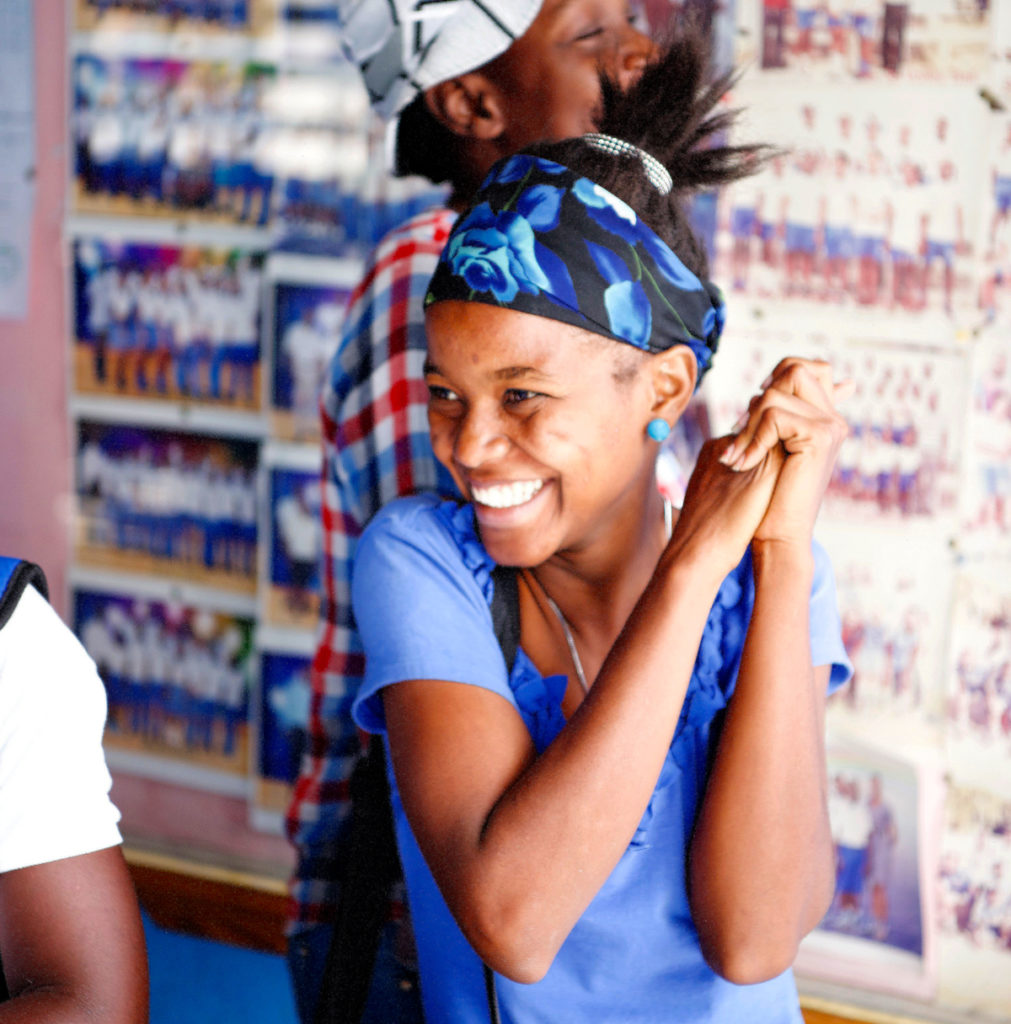
“To make sure they can take the classes, they have to take a little language and math test,” says Beverly Sanon, Holt’s representative in Haiti. If they pass the test, they then have to make a clear commitment that they’ll stick to the program. “They have to attend all the meetings, can’t be absent from school,” Beverly says.
While in the program, they receive a small monthly stipend to cover their expenses as well as a monthly package of food and nutritional supplements for their children. One of the rules the women must abide by is not to share the food they receive with anyone else.
“The food they get is for their kids,” Beverly says. “We have to see that the kids are growing and improving.”
At 20, Stephanie is the youngest woman in the program, but she has had enough life experience to recognize the value of this opportunity.
Very likely, by seeking out and earning herself a spot in this program, she already saved her son’s life.
“It was really, really bad,” Stephanie says of Steven’s condition last December. “But once I started the program, I started giving him the vitamins, the milk, the protein, the porridge. He started playing a little bit. He started being active, and now he’s fully growing.”
Every time the mothers meet as a group, on Fridays, they bring their children to be measured by our staff. To track their development, our staff compares their current height and weight with the baseline measurements they took at the beginning of the program. Since Stephanie first brought Steven in eight months ago, he has gained 5 and a half pounds and grown 2 inches.
Stephanie is grateful to the donors who provided this emergency food for her son, and who created this opportunity for her — describing it as a “second chance.”
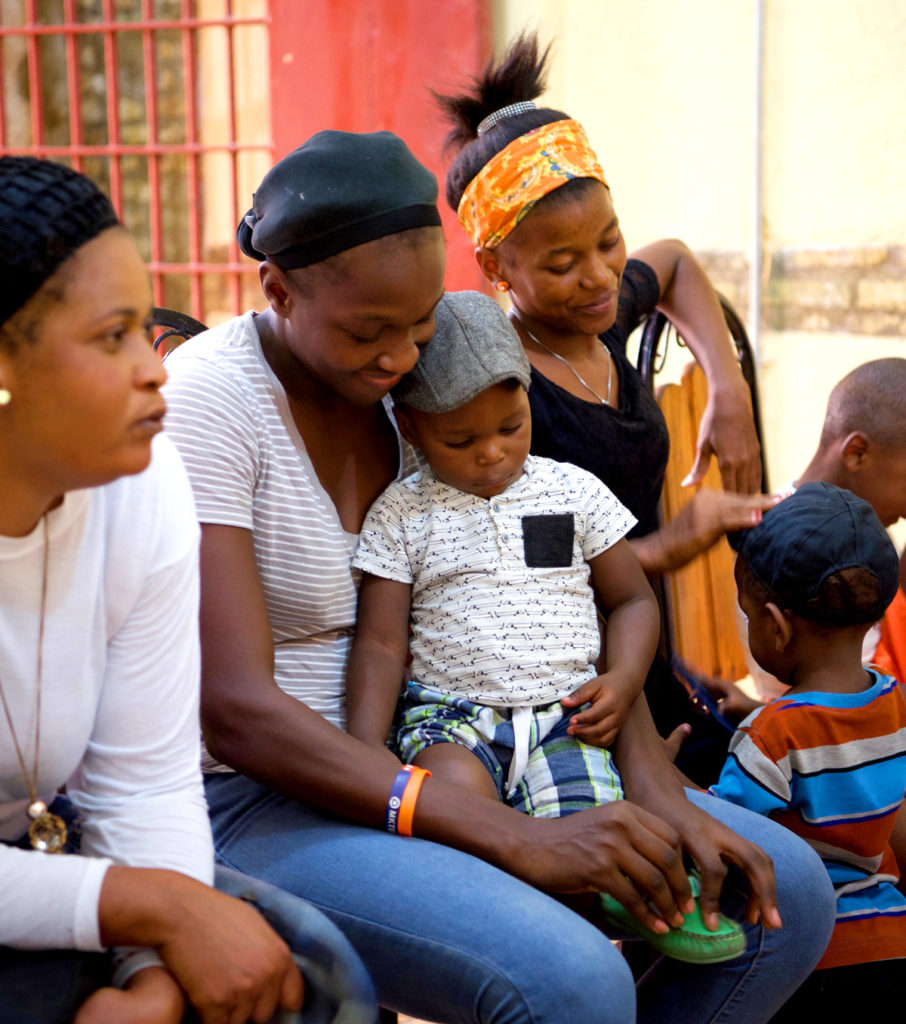
“I thank you a lot for what you have done in my life, and I would like you to be able to continue the program to help other women in my condition to whom you have given a second chance at life,” Stephanie says, speaking directly through the camera to the Holt donors who made this program possible. “So many women do not have that opportunity in Haiti, and for me to be here, I feel very happy, very proud — and thankful — for what’s happening in my life.”
“So many women do not have that opportunity in Haiti, and for me to be here, I feel very happy, very proud — and thankful — for what’s happening in my life.”
Stephanie, empowered mom
Mostly, she is thankful her son is doing so well.
“I’m really happy,” she says of Steven, as he plays in the background. “Compared to what he was before, he’s now a different child.”
Surviving as a Single Mother Despite Gender Inequality in Haiti
It’s hard to be a single parent anywhere. Even in developed countries, the demands on one person to serve as both sole caregiver and sole provider could overwhelm and exhaust just about anyone. But in Haiti, the depth of poverty, lack of opportunity and all-but-total absence of social support services makes it all but impossible to successfully raise a child on your own. For single moms, the struggle is made even worse by a stigma that just won’t go away – even in urban and relatively modern parts of the world like Seoul, New Delhi or Port-au-Prince.
“There is a stigma of single motherhood in Haiti,” says Beverly. When their daughter comes home pregnant and unmarried, parents are sometimes so disapproving that they will essentially disown both their daughter and their grandchild.
“Sometimes, they are kicked out of their house and have to find refuge with other family members,” she says. In other cases, parents are sympathetic, but have their own struggles and can’t afford another mouth to feed.
With so few jobs and so many people out of work, family members move wherever they can to find work, even if this means leaving their child in someone else’s care. Many of the women in the program also grew up in struggling, single-parent households. Some were raised by grandparents, aunts or other family members. Others by friends or neighbors.
“I don’t know my own mother,” Stephanie tells us. “I was 3 when I was taken by someone who raised me.”

But like the other women in the program, Stephanie is determined to raise her two sons herself, even if it means raising them on her own. When her first son, Balde, was born, his father pressured Stephanie to give him to his mother to raise him. She refused, and Balde’s father refused to help Stephanie support their child. After Stephanie developed a new relationship, she give birth to Steven. But Steven’s father wanted nothing to do with Balde because he wasn’t his biological child.
Soon afterward, Stephanie found herself parenting both sons on her own, with no help from either of their fathers. Like many women living in poverty in Haiti, she tried working as a street vendor — selling bananas, eggs and bread — but she never earned enough to meet her children’s needs.
“I couldn’t survive,” she says. “I had nothing.”
“I couldn’t survive. I had nothing.”
Stephanie
As a woman, it’s not surprising that Stephanie struggled to find work that payed enough. In Haiti, as in many places, skilled trades earn significantly more than washing clothes, selling food or cleaning houses. But most skilled trades are considered “men’s jobs.”
“Washing clothes can make 300 or 400 Haitian gourde ($4-5) every month,” says Beverly. “A maid in one place, 600-700. But if they work in a trade, they can make like 2,000 a month ($30).”
Depending on the project, some trades — like plumbing — can net as much as 15,000-25,000 gourdes, minus the cost of materials, for one job.
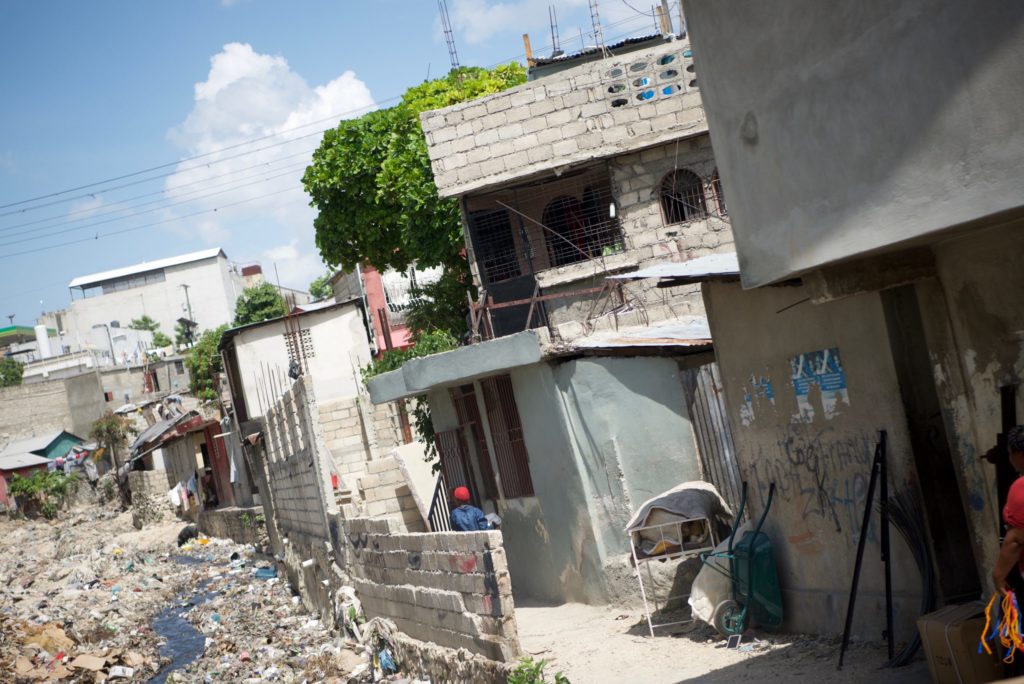
With so much of Port-au-Prince still in disrepair since the January 2010 earthquake, construction jobs are also in particularly high demand. With the first cohort of single moms, Beverly says those who chose to learn manual labor jobs like window or ceramic floor installation had more success finding work than those who chose service professions like money management. Now, our staff in Haiti encourages all of the women to choose a manual labor profession – a “man’s job.”
“Sometimes, they are the only girl in class,” Beverly says. “But teachers appreciate that women are being empowered. We encourage the women to be aggressive — and they are doing well!”
Of all the options, Stephanie chose to study plumbing. At the professional school she attends, she is one of four girls in a class of about 20 — all four of them a part of Holt’s single mother’s program. But that doesn’t bother Stephanie. She will do what she needs to do to provide for her sons, and with pride.
Sassy and assertive, she can also hold her own among the boys.
“The boys, when putting the toilet together, they ask, ‘As a woman, you want to do that dirty job?’” she says, practically dancing with laughter. “And I say, ‘No matter how dirty it is, I’m gonna’ make my money.’”

Building a Future for Their Children
On a scorching hot Sunday in late May, Stephanie and her classmates stand outside their professional school, piecing together a puzzle their teacher left for them to solve. Various lengths of white PVC pipe lay scattered on the ground as the students hover above. They all appear to be in their late teens and early 20s, in jeans and T-shirts, Converse shoes and low-hanging backpacks. The boys definitely outnumber the girls — but today, the girls have taken charge.
Today is also a special day. It’s Haitian Mother’s Day.
“I like working with them,” their plumbing instructor, Monsieur Peterson Polche, tells us from where he sits on a wooden bench in his empty classroom. The room is as spare and simple as it gets — several rows of benches and desks face a large green chalkboard.
“The girls are usually more disciplined than the guys,” he says. “They’re more attentive. Because they know it’s a man’s field, they work harder than the boys to be better in the classroom.”
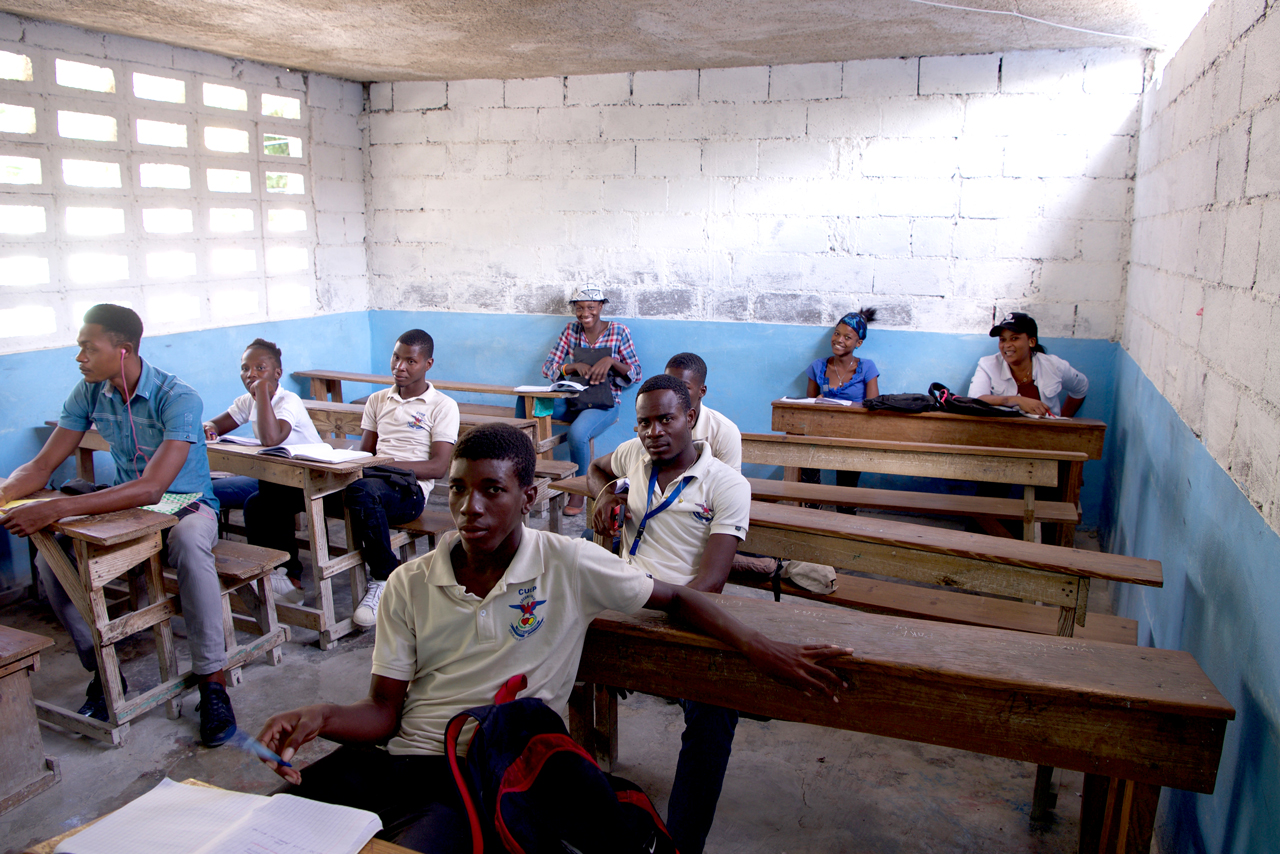
This is not Monsieur Polche’s first time teaching girls, he says. Several years ago, he took part in a UN program designed exclusively for women — to teach them electrical, plumbing and construction professions.
“I know many of them who have done very well,” he says. “Some were able to leave the country to get more experience and come back.” One student recently called to ask him to do electrical work for a job she’s working on.
“So I was able to get a job!” he says. “She’s doing so well. I’ve seen her design beautiful things.”
Out in the courtyard, Widline — a fellow single mom and one of Stephanie’s classmates — holds up a piece of pipe and asks the assistant instructor if this is the same pipe they use for hot water as for cold. Their assignment is to piece together the layout of a bathroom, with concrete blocks representing the sink, toilet and bathtub. Their practical exam will present a similar challenge. This is just for practice.

As a generator buzzes loudly in the background, the students work together to lay out the pipe. Stephanie stands above and points out missing pieces. Another mom in the program, Nadine, takes measurements and saws the pipe using a little hacksaw blade — minus the saw. Resources are limited and they use what they have.
“Do you understand?” one of the boys, in a backwards ballcap, asks the girls — teasingly.
“What did you say?” Stephanie responds with a playful smile.
“Yes, we’ve done this before,” Widline says. Widline is 21, tall and slender, with a gentle and friendly disposition. To class today she wore skinny jeans and a denim fishing hat, a crossbody purse and a black shirt with little rhinestones on it.

Like Stephanie, Widline had an unstable home life growing up. She lived with her mom and two sisters, but her father never took care of them. Sometimes, she lived at her aunt’s house.
When she got pregnant with her son, Bernardo, Widline had just finished high school. She had no source of income and no place to stay.
“I didn’t know how I would provide for my son’s needs,” she says. “But whatever job I could find to help my son survive, I would do it.”
“Whatever job I could find to help my son survive, I would do it.”
Widline
Malnourished herself, Widline didn’t have enough breastmilk to feed her infant son. Much like Stephanie’s son, Bernardo grew so malnourished that he lost his appetite completely. This, it turns out, is a common and perplexing effect of malnutrition. Children simply stop eating.
But when Widline earned a spot in Holt’s single mothers program, and started receiving the monthly packages of food, she was elated to see her son start eating again. “He likes the milk, the protein. That helps a lot,” she says. “And now, he gets to eat meat, which he didn’t get to eat before.”
Widline just started the program a few months ago, but already she has impressed her family. At first, they doubted her abilities.
“My aunt knew I was learning plumbing,” she tells us. “One day she said, ‘If you are learning plumbing, you should be able to solve that little problem.’ There was a clog in the shower drain.”

Widline, ever humble, admitted she wasn’t very experienced. She was only in her second trimester at school, and she didn’t have her tool kit yet. But in typical Haitian fashion, she got resourceful – using a screwdriver to open the drain and dig out the clog.
“I put the cover back on and told them – go try it!” she says. “They were able to use it and now, there is no problem.”
Surprised, and impressed, her family began taking Widline’s ambition more seriously.
“’Now,’ I said to myself, ‘I’m a boss,’” Widline says, laughing. In Haiti, when you have mastered a skill or a job, you become a “boss.”
“’Now,’ I said to myself, ‘I’m a boss.'”
Widline, empowered mom
“They didn’t believe she could do it … They were making fun of her,” Beverly says later of Widline’s family. Although Widline has the self-confidence not to let others get to her, some of the women in the program have a hard time believing in themselves.
“After they gave birth, they felt helpless and not sure what to do,” explains Beverly. “They need to believe in themselves and in their future.”
As part of the program, Beverly and her social work team spend a lot of time counseling and encouraging the women. And as a mother and former schoolteacher, Beverly is an excellent counselor for this group of young women. She has that unique ability of every great teacher to be both firm and direct while at the same time nurturing and gentle.
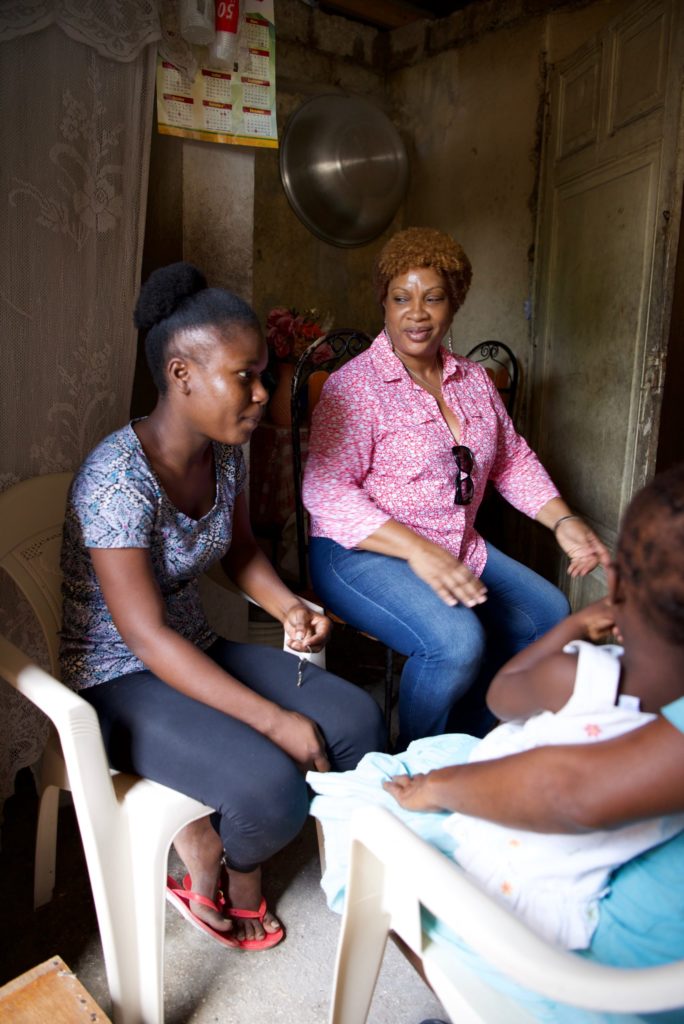
If they miss class, Beverly and her team will talk to the women and help them figure out childcare. It’s also important they never miss Friday meetings. On Fridays, the women attend a computer training class where they learn to write a resume and apply for jobs. Sometimes, women from the previous cohort visit the group to serve as mentors and share how they accomplished their goals.
Through meeting and taking classes together, the current group of moms have also become a support group for each other. “They have become friends,” Beverly says. “They’ve developed a camaraderie, so they like coming to the meetings.”
When we ask Monsieur Polche whether the women will have a harder time finding a job after they graduate, he says, “Yes and No. It depends on the person.” Although they may face some discrimination as women in a man’s field, it mostly depends on who they know, he says.
“People usually give jobs to people they know,” he says. “If they don’t know you, they don’t know what you’re able to do.”
But now, they know Monsieur Polche, who says he would definitely recommend the female students in his class, all of whom have good grades. He tell us he thinks the single mother’s program is “very, very good” because so many women can’t afford to pay the monthly fees to attend professional school.
“If it could be longer and allow for more women to benefit from the program, that would be better, because there are so many women who have nothing,” he says. “It’s very important.”
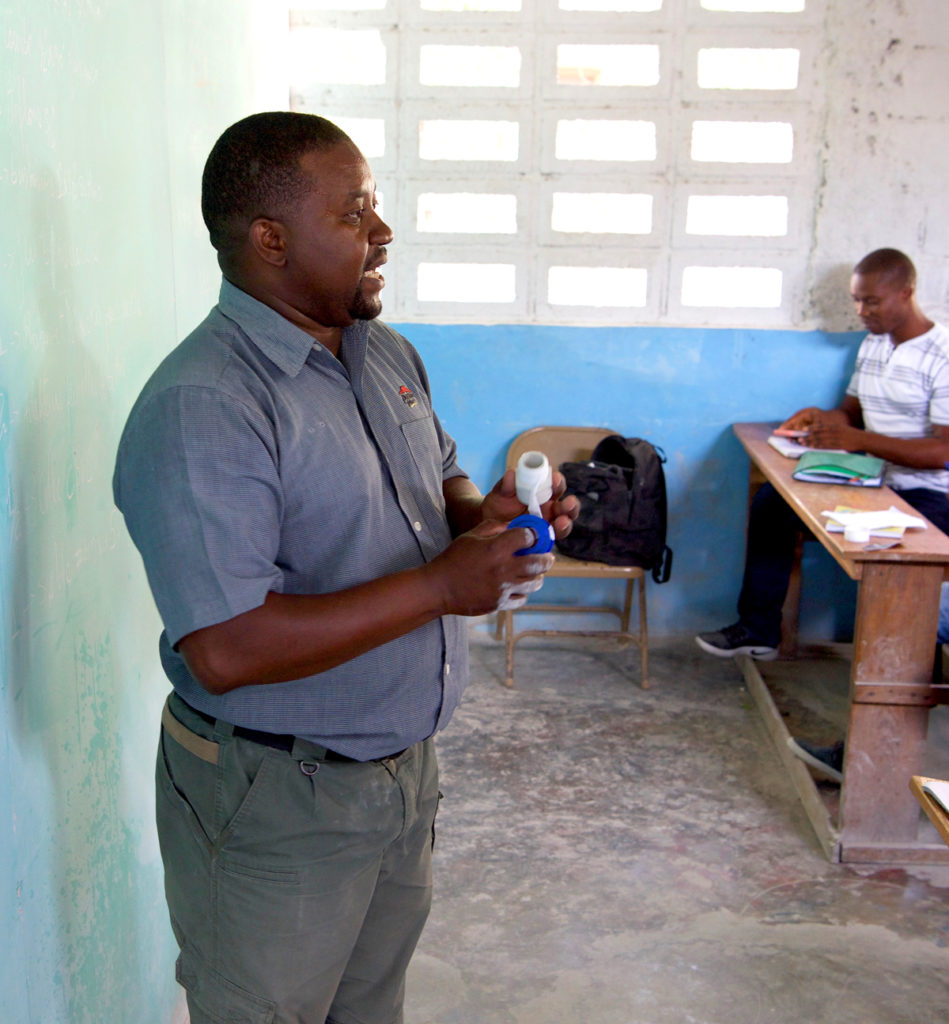
When he has jobs, Monsieur Polche sometimes invites his best students to come along and get hands-on experience. He also advises the students, once they graduate, to group themselves as a collective and offer their plumbing services to local businesses.
Later, when we ask the women whether they would be interested in going into business together, they say yes — “but not with the boys,” they joke.
At the end of class, we give the women a ride home from school, which will take considerably less time than riding by “tap tap” — the privately owned shuttles that take the place of public transport in Port-au-Prince. Sitting together, they talk and giggle about the day — speaking in Creole, so we can’t understand. We ask how often they study, and they say, “every day.” We ask what they like to do in their free time. “Watch movies, crack jokes together,” Stephanie says. They like to read, they say, or watch Brazilian soap operas dubbed in French.
In so many ways, they are still just girls. But they are also moms. And now, they are bosses.

Thank You For Helping Mothers Like Me
The women have worked hard to get into the single mother’s program. And now they are working hard to graduate and find a job.
But they also know that without the support of Holt sponsors and donors in the U.S., they would not have this opportunity. We ask each of the women them to share how they feel about the people who are supporting them, and here’s what they have to say.
Like many of the women, Stephanie uses a common phrase in Haitian Creole to express the depth of her gratitude. “Mèsi anpil, anpil, anpil!” she exclaims, with a huge, generous smile. Thank you very, very, very much.
Widline, holding her son Bernardo, says, “Thank you for all the help you provide. Thanks to you, I have a profession now. With the money that I earn, I will be able to help him with the things that he needs. Mèsi anpil, anpil, anpil. May God bless you!”
Both Stephanie and Widline express a desire for donors to help more single moms like her. “May God continue helping you so you can continue helping mothers in need,” Widline says. “Mothers like me.”
“May God continue helping you so you can continue helping mothers in need. Mothers like me.”
Widline
The other women echo Stephanie and Widline, sharing similar sentiments and expressions of gratitude. But perhaps the most honest insight comes not from one of the single moms themselves, but from one of their mothers.

“At first, I was a little worried, wondering how can out of nothing people decide to help you?” says Madame Rosemene, a woman in her early 50s whose daughter Dayana is studying ceramic floor installation. Dayana has a 2-year-old daughter named Kiana.
“What would be the price after?” Madame Rosemene wondered. “But then I realized as the months passed, and I saw what was happening, I saw that there are people with good hearts who are willing to help young women in Haiti. For the way you help with Dayana to help her raise her child, I thank God for you.”
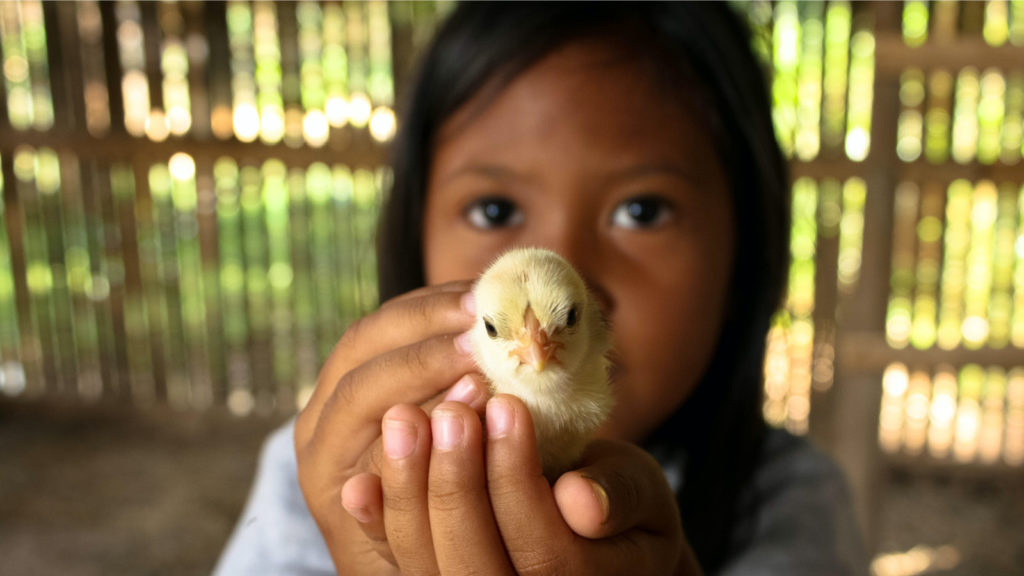
Give a Gift of Hope
Give a lifesaving or life-changing tangible gift to a child or family in need. And this holiday season, give in honor of a loved one and they’ll receive a free card!


